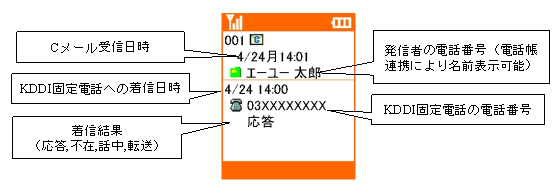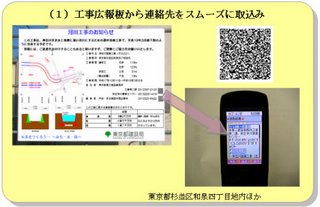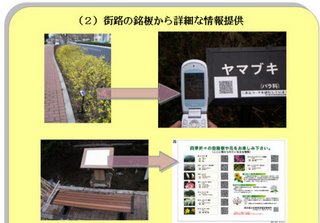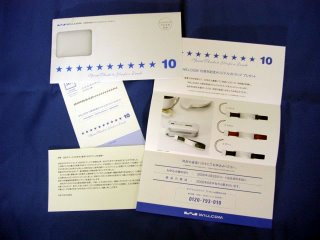Thursday, April 27, 2006
New Nokia N-Series handsets cause a stir in Japan
The new models are the N72, which stands out for its chic design, the N73 which sports a camera with auto-focus and the N93 which is an evolution of the N90 phone-video camera hybrid.
Wednesday, April 26, 2006
Mobile and financial worlds become increasingly linked in Japan
It seems that the mobile and financial worlds are really beginning to converge in Japan. It started with 'o-saifu keitai' or 'wallet phones' – containing contactless IC chips that you can load with electronic cash.
DoCoMo’s collaboration with Mistui Sumitomo bank to produce their iD credit card service for mobiles created further links between the mobile and financial industries. Now the divide is set to blur further as KDDI and the Bank of Tokyo-Mitsubishi UFJ have today confirmed that their new mobile-online bank will open in mid-2007.
Full details have yet to be confirmed, but the aim of the bank, which is a 50:50 JV between the two companies, is to offer “an unprecedented financial service centred on the mobile phone”.
Tuesday, April 25, 2006
Willcom bundle Windows Mobile PPC with mini voice handset
Sharp’s Windows Mobile Pocket PC handset, W-Zero3, is arguably one of the most popular handsets on the Willcom network. It flew off the shelves when introduced and was voted handset of the year 2005 by one public poll.
However, even the most adamant fans of PPC handsets will agree that they are not the most portable of devices and I suspect many owners will chose to leave their PPC phone at home on a night out or weekend away. To address this concern, Willcom has today started selling a bundled set of the W-Zero3 PPC together with its TT (Tiny Talk) handset.
Both the W-Zero3 and the TT make use of Willcom’s W-Sim modular technology. The W-Sim is an extended version of a SIM card, containing not only user data but also all the transmission technology needed for a mobile device to work. To switch phones, all the owner has to do is simply pull out the W-Sim from one device and plug it into the other.
The small size of the TT makes it a perfect compliment to the W-Zero3 and as the W-Sim can easily be swapped on the go, the package is a great solution to those who want the functionality of a PPC handset but don’t always want to carry it around with them.
The small TT and the more bulky W-Zero3 (Images (c) Impress Watch Corportation)
Monday, April 24, 2006
KDDI launches new service for subscribers of both its fixed and mobile offerings

KDDI, the parent company of Japan’s second mobile operator, is also a large player in the business and residential fixed line market and today the company announced a new service of interest to customers who subscribe to both its fixed and mobile packages.
The new, free service monitors fixed line activity and sends a c-mail (similar to SMS) to the subscriber’s mobile phone to inform them of incoming calls. The c-mail gives the caller’s name and number, time of call and whether the call was answered or not.
Although all three major Japanese operators have stakes in the fixed line business (DoCoMo through NTT and now Vodafone through Softbank’s Japan Telecom), there are few services which really take advantage of this. This will perhaps become a key advantage for the three big operators to exploit as the imminent new entrants to the Japanese mobile market begin to vie for their market share.
Friday, April 21, 2006
Survey on Vodafone's acquisition by Softbank
Today Japanese research company Infoplant released the results of an interesting survey they carried out regarding the acquisition of Vodafone by Softbank.
It seems there was some dissatisfaction amongst Vodafone customers in Japan, as when asked if they welcomed the acquisition, 45.3% of Vodafone subscribers said they did compared to 39.8% of au and 35.3% of DoCoMo customers.
Next respondents were asked about the possibility of a name change for the operator. Apparently, Vodafone customers would like to keep hold of their Vodafone email addresses as 37.3% said they would like the brand to remain. This compared to only 20% for subscribers of the other two operators.
The third question in the survey was a bit of a no-brainer – what would respondents like to see from Softbank’s mobile survey. Naturally, the most frequent response by far was a reduction in tariffs!
Thursday, April 13, 2006
Tokyo gets QR coded

Tokyo Metropolitan Government today launched a mobile service by which citizens and visitors to Tokyo can use their QR code-enabled phone to access more information on a whole variety of things such as landmarks, roads, plants, zoo animals and construction works.
By capturing a QR code on a plant, phone owners are redirected to detailed information about the plant. QR codes on notices for roadworks provide update inf
 ormation and contact details for companies involved.
ormation and contact details for companies involved.Monday, April 10, 2006
DoCoMo announces details of 2006 "mobile safety classes"
For elementary school children, the classes will be based on cartoons teaching the fundamental rules and manners. For all ages there will also be sections on privacy, mobile crime and the use of mobiles in times of disaster.
In a market where children are becoming an increasingly important source of new subscribers, operators are putting a lot of effort into gaining a foothold in this demographic, with au also providing mobile classrooms for elementary school kids.
Friday, April 07, 2006
10-year customers get present from Willcom

Last summer, PHS operator Willcom celebrated its tenth anniversary. The service was originally launched in July 1995 as DDI Pocket, but it changed its name to Willcom in 2005.
To celebrate this anniversary, Willcom has announced that it is offering a free present to all its customers who signed up to DDI Pocket between July 1995 and March 1996 and were still Willcom customers in March 2006. The present itself is a choice of rather dull phone straps, but, as they say with presents, it’s the thought that counts.
This really says something about the low churn rates of operators in Japan. If any UK operators were to give out presents to their customers of 10 years, I don’t think they’d have many to give away! The longest I’ve stayed with an operator is two years (and that was in Japan!).
image: Letters sent to Willcom's 10-year customers (c) Mainichi Communications Inc.
Thursday, April 06, 2006
Comedy handset breakage
This week’s entry comes from Ms Takehara from near Tokyo who lost her Panasonic P901i. On the fateful day she put her phone, usually kept in her bag, in her pocket. When biking to work as usual, she stopped at the traffic lights and, alas, the phone tumbled from her pocket into the road. By the time she noticed and looked back, the phone was in the pictured state:
 “I lost all my pictures and emails and had to spend 7,000 yen on a replacement”, laments Takehara.
“I lost all my pictures and emails and had to spend 7,000 yen on a replacement”, laments Takehara.image (c) Impress Watch
Tuesday, April 04, 2006
DoCoMo launches credit service for kids as young as 12
Unlike DCMX and DCMX Gold, DCMX mini users are not issued with a plastic credit card, but the services is all based around wallet phones. The application process can be done over i-mode and the phone can be used in outlets supporting “iD”. There is a credit limit of 10,000 yen and the total amount spent is added to the subscriber’s phone bill at the end of the month.
The service will be launched at the end of this month.
Monday, April 03, 2006
World's hardest to read blog?
The site has a special feature - the items are not just about QR codes, they are QR codes! QR codes can hold over 1,800 Japanese characters – more than enough for a blog entry.
The blog boast that is the “world’s hardest to read blog” and that’s certainly true for me. Not having a QR code reader phone, I can’t read it at all!



